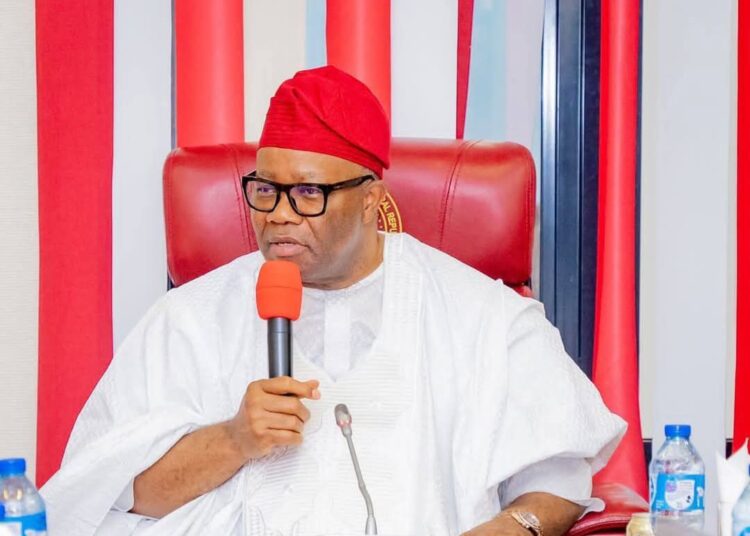Far from being a “department of the executive,” the 10th Senate under Godswill Akpabio has delivered a record of legislative productivity unmatched since 1999. Res Ipsa Liquitor
Concerned by the Sunday October 12, 2025 editorial in LEADERSHIP Sunday, which levelled a number of serious criticisms against the 10th Senate and its leadership under Senate President Godswill Akpabio,GCON, we feel a profound sense of duty to respond with fidelity to the facts. It is therefore necessary to address each point raised directly, to clarify the misconceptions that underpin them, and to accurately situate the accomplishments and ongoing challenges of the 10th Senate within their proper context.
Regrettably, the editorial opens its first salvo by questioning the relevance and impact of the National Assembly, remarking on a perceived disconnect between the Senate and the everyday struggles of Nigerians though not limited to hunger, insecurity, and unemployment. It goes on to depict Senate President Akpabio as lacking sincerity, accusing him of a form of political duplicity. While the sentiments about Nigeria’s harsh realities are undeniably genuine, the 33 million Nigerians facing acute food and security challenges as cited by Akpabio himself are not fabrications. However, to conflate a leader’s evolving discourse with institutional inaction is a fundamental error. The documented legislative record directly contradicts the notion of an inert or complacent Senate.
It is worth emphasising that under Akpabio’s stewardship, the 10th Senate has so far passed over 90 bills, about 58 already signed into law within a remarkably short period since June 2023. These laws are directly aligned with the very challenges that the editorial rightly highlights. The Nigeria Electricity Act (Amendment), for example, uproots a decades-old monopoly and introduces concurrent legislative authority for power generation to the states. This reform empowers every state in the federation to address national energy deficits, a critical step towards ameliorating power shortages that have long constrained economic growth. Indeed, energy remains one of Nigeria’s primary development bottlenecks, and the legislative initiative here demonstrates the Senate’s commitment to solving it.
Similarly, any objective comparison of the 10th Senate’s record with those of its immediate predecessors shows a striking difference in productivity. By a comparable point in their tenures, the 8th Senate had passed only 32 bills, and the 9th Senate approximately 58. The 10th Senate, in under two years, has already surpassed 90 bills, a significant number of which are transformative reforms targeting Nigeria’s core socio- economic and governance challenges. This volume of output signifies not just legislative activity, but a focused and efficient institution under Akpabio’s leadership. To therefore label this Senate as the “worst in history” is profoundly misleading. Empirical evidence which LEADERSHIP can fact-check clearly positions it, by the metrics of both output and ambition, as the most productive since 1999. “Worst” is a subjective judgement; 90 bills and 58 acts in under two years are objective facts that challenge this narrative profoundly.
Progress in economic governance is exemplified by the Nigeria Tax Acts and Fiscal Policy Reform Acts which harmonise disparate tax administrations across federal and sub-national levels, aiming to expand revenue generation beyond the country’s over-reliance on oil. This effort is crucial for economic stability, cutting corruption opportunities, and ensuring sustainable development funding. It is worth highlighting that this transformation of Nigeria’s tax system parallels successful models in neighbouring Ghana, where tax base expansion and digital identification systems have markedly advanced fiscal health.
In addressing hunger in the land, which is at the heart of this discourse, it is important to reiterate how crucial the Nigeria Tax and Fiscal Policy Reform Acts are. For decades, Nigeria’s tax-to-GDP ratio has languished around 10 per cent, well below the African average and peers like Ghana. These reforms are the essential, non-negotiable first step to building the fiscal muscle required to fund food security and other social programmes sustainably. You cannot defeat hunger with an empty treasury.
Next, regarding education, the Student Loans (Access to Higher Education) Act and the Nigerian Education Loan Fund represent a bold effort to address financial barriers facing millions of tertiary students. While the editorial rightly points to implementation challenges, it only partially captures the significance of this legislation. Over half a million students have already benefited from the Fund’s loans, a notable investment in human capital that must be lauded for its long-term benefits against the immediate difficulties experienced in rollout.
Security concerns, particularly the Control of Small Arms and Light Weapons Act and the modernisation of the Defence Industries Corporation, directly address the scourge of banditry, terrorism, and communal violence cited by the editorial. It must be recognised that reversing decades of arms proliferation and dependency on expensive foreign imports is no simple legislative act but a serious structural endeavour. These laws give Nigeria the framework and tools to take real steps forward in stabilising the country and buttressing national sovereignty.
The Police Professionalism and Accountability Act and the Fiscal Responsibility and Transparency Act both seek to embed good governance principles, accountability, transparency, and oversight in the very fabric of Nigeria’s law enforcement and public financial management. These are long overdue reforms that respond directly to widespread public demands for better policing and the end of corruption.
Moreover, the ambitious Local Government Autonomy Act, though constitutionally challenging, aims to place power closer to the people, enabling local governments to deliver healthcare, education, and infrastructure more effectively. The editorial accurately identifies the political sensitivity of this reform, but its ambition is necessary for true federalism and grassroots empowerment.
On the matter of the 2025 Appropriation Act, the editorial praises the return to a January to December fiscal year budget cycle yet expresses doubts about budget content and execution. These concerns are valid; however, the Senate’s prompt passage of the budget underscores a renewed commitment to fiscal discipline and macroeconomic stability. Effective oversight remains an ongoing institutional challenge, yet it is one the 10th Senate takes seriously.
On increasing the National Minimum Wage, it is true that ensuring enforcement across all government levels and extending benefits beyond the formal sector are challenges that remain. Nonetheless, the legislative commitment to raise wages reflects an understanding of social justice imperatives and the need to improve Nigerians’ living standards.
It is also important to address the editorial’s comparison between senators’ earnings and the minimum wage. The insinuation that lawmakers are aloof from public hardship, while a persistent sentiment, overlooks the constitutional reality. Salaries and allowances are not self-determined by the Senate but are set by the independent Revenue Mobilisation, Allocation and Fiscal Commission. Furthermore, this very Senate is actively engaged in debates and legislative measures, such as the Fiscal Responsibility Act, designed to rationalise public spending and ensure value for every naira spent, including its own.
We must also call attention to the sexist and outdated remark in the editorial that “a worker whose wife goes to the same market as the senator’s wife” suffers from inequality. This assumption is inaccurate and unhelpful. Nigerian men, like women, engage fully in household management, including shopping and budgeting. Families today are driven by shared responsibilities. Economic hardship does not discriminate by gender, and such expressions trivialise the shared burden that all Nigerians carry in this moment of reform and adjustment.
A word, too, must be said about Senator Godswill Akpabio himself. His record did not begin in 2023. Long before he became Senate President, Akpabio earned International renown as the “Uncommon Transformer” of Akwa Ibom State. His tenure as governor remains a case study in infrastructure revolution and social investment. From the modernisation of Uyo into one of Nigeria’s most aesthetically developed state capitals to the free education and healthcare schemes that improved thousands of lives, Akpabio’s leadership legacy is not theoretical but a profound rebirth. It is visible in schools, hospitals, roads, and industries that still serve the people today. His transition from executive governance to legislative leadership has brought that same visionary drive into the Senate, shaping a chamber that legislates not for applause but for posterity.
The accusation that the Senate functions merely as a department of the executive is perhaps the most misleading and uncharitable claim of all. Legislative independence is not measured by noise or confrontation but by results. The 10th Senate has shown that constructive engagement with the executive has consistently produced outcomes beneficial to Nigerians. Legislative independence is not measured by public confrontation or obstructionism, but by the capacity to deliver transformative laws. A cooperative model that produces the Electricity Act or the Defence Industries Corporation Act demonstrates a mature, results-oriented governance, not subservience.
While acknowledging the very real and relentless hardships facing ordinary Nigerians, it is important to recognise that the 10th Senate under Godswill Akpabio has worked assiduously to address these issues through meaningful legislations. The transformative nature of these laws is not simply symbolic; they lay the foundation for tackling Nigeria’s fundamental socio-economic and governance challenges.
Additionally, while we agree with our friends at LEADERSHIP that words alone will not feed Nigerians, we must point out that that is not an argument against lawmaking. Instead, we see it as a call for partnership in execution. The Senate makes laws. The Executive implements them. The Judiciary interprets them. The media, we add, must inform and educate with responsibility, not despair.
To be exceedingly clear, the 10th Senate has chosen the hard road of reform over the easy road of rhetoric. Legal reforms to our tax system, liberalised power, expanded educational access, raised wages, modernised defence, and strengthened fiscal accountability are building blocks of renewal, not talking points for cynics.
So, when the Senate President says hunger requires “policy direction and diligent execution,” he speaks not as a man reborn for politics but as a public servant reaffirming purpose. Hunger, poverty, and insecurity remain Nigeria’s fiercest enemies. The 10th Senate, under Senator Godswill Akpabio, has confronted them with the only weapon available to any legislature in the world: the law.
For the avoidance of doubt, Nigeria’s problems are systemic and require sustained multi-sectoral efforts across all branches of government and society. It is neither fair nor accurate to dismiss the current Senate as a body lacking checks and balances. The record of legislative activity contradicts this claim, and under Akpabio, the National Assembly has shown it can be a proactive partner in nation-building.
We must move beyond cynicism to hold all leaders accountable through informed engagement and active citizenship. The Senate’s laws provide tools that, if implemented fully and fairly, can lift millions from hunger, insecurity, and poverty. The true test lies ahead, not in political rhetoric but in diligent execution by those entrusted with governance.
Let all Nigerians join in demanding that these promising legislative achievements become living laws that transform lives, thus honouring the foresight of the 10th Senate and all who strive for a better Nigeria.
– Rt Hon Eseme Eyiboh mnipr Special Adviser, Media/Publicity and official Spokesperson for the President of the Senate





